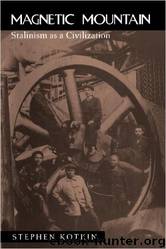Magnetic Mountain by Kotkin Stephen;

Author:Kotkin, Stephen; [Kotkin, Stephen;]
Language: eng
Format: epub
Publisher: University of California Press
Published: 1995-04-19T23:00:00+00:00
THE ENDURANCE OF PIETY
Overall, the effects of the terror, as John Scott observed, were paradoxical. Industrial production declined dramatically, and literal chaos often ensued (in 1937, coke plant construction did not fulfill its plan for a single month, sinking to a low of 27 percent in December).331 But as Scott also noted, “officials and administrators who had formerly come to work at ten, gone home at four-thirty, and shrugged their shoulders at complaints, difficulties, and failures, began to stay at work from dawn till dark, to worry about the success or failure of their units, and to fight in a very real and earnest fashion for plan fulfillment, for economy, and for the well-being of their workers and employees, about whom they had previously not lost a wink of sleep.”332
For these reasons Stalin was long held in high esteem, the leader who knew how to deal with provincial bosses and bureaucrats, ruling with an iron fist and keeping them in check through fear. Herein lay no doubt one of the principal effects of the terror, an effect that was connected to the terror’s class aspect. But at the same time, many people appear to have been appalled at such methods and at the general leveling tendency that Stalin allowed free reign. This leveling tendency and its rueful consequences were apparent in the senseless disappearance of the Magnitogorsk’s well-known poets, Boris Ruchev and Mikhail Liugarin, as well as the secretary of the local writer’s union branch, Vasilii Makarov—the chief figures in the local “artistic intelligentsia.”333
The terror rent deep and lasting divisions within the society and shook Magnitogorsk to its foundations. But many—perhaps most—people tried to prevent it from undermining everything else that had taken place.334 Their country had been through a great deal and had achieved much, signs of which were there to see. Plebiscitary elections, complete with celebratory mass marches, continued to be held.335 And hundreds of workers and lower-level officials continued to receive medals and awards, from the Order of the Red Banner to the Order of Lenin, the state’s highest honor.336 Even more crucial in this regard was the irreplaceable experience of the decade-long socialist construction.
In February 1938 the city newspaper published the following commentary of a Magnitogorsk engineer, Burylev, the new deputy chief of open-hearth construction:
Soon it will be seven years that I’m working in Magnitogorsk. With my own eyes I’ve seen the pulsating, creative life of the builders of the Magnitogorsk giant. I myself have taken an active part in this construction with great enthusiasm. Our joy was great when we obtained the first Magnitogorsk steel from the wonderful open-hearth ovens. At the time there was no greater happiness for me than working in the open-hearth shop. Work in the open-hearth shop of the Magnitogorsk factory for me, a Soviet engineer, has been and is a new wonderful school. Here I enriched my theoretical knowledge and picked up practical habits, the Stakhanovite experience of work. Here as well I grew politically, acquired good experience in public-political work.
Download
This site does not store any files on its server. We only index and link to content provided by other sites. Please contact the content providers to delete copyright contents if any and email us, we'll remove relevant links or contents immediately.
| Africa | Americas |
| Arctic & Antarctica | Asia |
| Australia & Oceania | Europe |
| Middle East | Russia |
| United States | World |
| Ancient Civilizations | Military |
| Historical Study & Educational Resources |
Red Famine: Stalin's War on Ukraine by Anne Applebaum(2472)
Chernobyl by Serhii Plokhy(2137)
Midnight in Chernobyl by Adam Higginbotham(2084)
The House of Government by Slezkine Yuri(1851)
Midnight in Chernobyl: The Untold Story of the World's Greatest Nuclear Disaster by Adam Higginbotham(1778)
Red Shambhala by Andrei Znamenski(1753)
The Gulag Archipelago (Vintage Classics) by Aleksandr Solzhenitsyn(1731)
From Cold War to Hot Peace by Michael McFaul(1714)
All the Kremlin's Men by Mikhail Zygar(1703)
Putin's Labyrinth(1663)
Red Notice by Bill Browder(1598)
The Future Is History by Masha Gessen(1594)
From Russia with Lunch by David Smiedt(1554)
A People's Tragedy by Orlando Figes(1546)
The Romanovs by Simon Sebag Montefiore(1502)
How to Tame a Fox (and Build a Dog): Visionary Scientists and a Siberian Tale of Jump-Started Evolution by Lee Alan Dugatkin & Lyudmila Trut(1469)
Putin's Labyrinth: Spies, Murder, and the Dark Heart of the New Russia(1457)
The Lost Spy by Andrew Meier(1400)
Art and Revolution by John Berger(1391)
